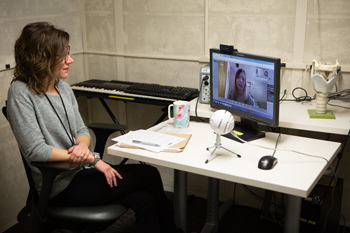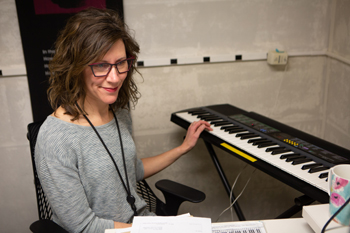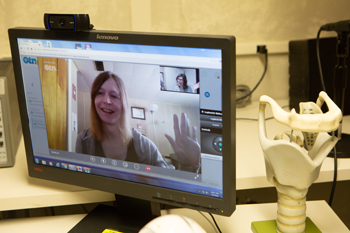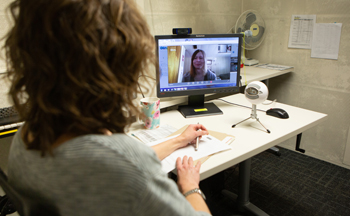Eliminating barriers, enhancing equity and access in health care by virtually connecting patients and providers

By Emily Dawson

From the comfort of home: Evolving OTN technology allows Amber Risk (onscreen) to virtually join Gwen Merrick for a Voice Clinic appointment. (Photos by Katie Cooper)



Clinicians are breaking down geographic, social-economic, and psychosocial barriers that traditional in-person treatments create by simply sitting in front of a computer and reaching across the province to someone who needs their support.
Telepractice – a specific application of telemedicine for the delivery of speech language pathology – helped Amber Risk, a trans woman living in North Bay, access voice feminization therapy. This service isn’t provided in her home town but available almost four hours away at St. Michael’s Hospital.
“Without telepractice, I would not have access to this kind of therapy. None of the Speech Language Pathologists in my city specializes in trans care,” said Risk. “I would have to travel to Toronto for every appointment, which would be cost and time prohibitive for me – as it would be for many people.”
St. Michael’s Voice Clinic Speech Language Pathologist (SLP) Gwen Merrick uses a real-time, videoconferencing connection to offer Risk one-on-one sessions in support of her therapy goal to feminize her voice and communication style.
Merrick also runs group therapy programs for trans women out of the hospital’s same Clinic.
“When I think of the future of my practice, I think of people like Amber being able to participate in and benefit from group therapy as well even though they are hundreds of kilometers away,” she said.
“I have a client in my group with social anxiety. Although she decided to join us in person, her anxiety could have created a barrier for her care. Telepractice could allow someone to join the group virtually from home and still benefit from the group.”
Every year the Voice Clinic provides more than 2,000 therapy sessions for people with voice, swallowing and breathing disorders. Telepractice is allowing SLPs to reach a greater number of patients while also addressing equity and access issues.
“There are things we cannot do via telepractice in terms of hands-on care,” said Marta DeLuca, another of the Clinic’s SLPs, who understands that there are some limits to the technology.
“But it certainly makes voice therapy accessible and helps bridge the gap for those who otherwise wouldn’t receive the care they need. I even have a patient in his 80s who now accesses therapy on his iPad!”
“Telepractice certainly makes voice therapy accessible and helps bridge the gap for those who otherwise wouldn’t receive the care they need.” – Marta DeLuca, speach language pathologist |
And as technology goes, it is evolving quickly. Even as recently as 2017, clients had to travel to a designated Ontario Telemedicine Network (OTN) site to access the Clinic’s services. Fast forward and in less than two years clients are now accessing OTN on their personal computers, tablets or other mobile devices.
“Accessing telepractice from a client’s home, office or mobile makes the therapy much more personal – we’re bringing our care right to those who need it,” said Merrick.
About St. Michael’s Hospital
St. Michael’s Hospital provides compassionate care to all who enter its doors. The hospital also provides outstanding medical education to future health care professionals in more than 27 academic disciplines. Critical care and trauma, heart disease, neurosurgery, diabetes, cancer care, care of the homeless and global health are among the Hospital’s recognized areas of expertise. Through the Keenan Research Centre and the Li Ka Shing International Healthcare Education Centre, which make up the Li Ka Shing Knowledge Institute, research and education at St. Michael’s Hospital are recognized and make an impact around the world. Founded in 1892, the hospital is fully affiliated with the University of Toronto.
About Unity Health Toronto
Unity Health Toronto, comprised of Providence Healthcare, St. Joseph’s Health Centre and St. Michael’s Hospital, works to advance the health of everyone in our urban communities and beyond. Our health network serves patients, residents and clients across the full spectrum of care, spanning primary care, secondary community care, tertiary and quaternary care services to post-acute through rehabilitation, palliative care and long-term care, while investing in world-class research and education. For more information, visit www.unityhealth.to.
